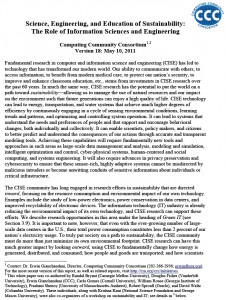 As we’ve previously reported in this space, the NSF’s CISE Directorate and the Computing Community Consortium (CCC) jointly sponsored a Workshop on the Role of Information Sciences and Engineering in Sustainability on February 3-4, 2011, in Washington, DC. A primary goal was to bring together leading researchers in a wide range of disciplines spanning sustainability and information technology to discuss research challenges in this area.
As we’ve previously reported in this space, the NSF’s CISE Directorate and the Computing Community Consortium (CCC) jointly sponsored a Workshop on the Role of Information Sciences and Engineering in Sustainability on February 3-4, 2011, in Washington, DC. A primary goal was to bring together leading researchers in a wide range of disciplines spanning sustainability and information technology to discuss research challenges in this area.
The workshop participants were unanimous in their belief that CISE innovations are critical for addressing core problems in sustainability, to include energy, transportation, and climate science and the environment. In the final report, we have articulated guiding principles for achieving sustainability through CISE research, as well as specific CISE areas that can support fundamental improvements in sustainability. Along the way, we have provided examples of the kinds of core discoveries and innovations that will be necessary for decreasing overall energy consumption while also increasing use of renewable energy sources; improving transportation to minimize energy usage and environmental impact; reducing and adapting to climate change; conserving natural habitats; eliminating waste by designing products for full reuse; and moving toward zero loss of non-renewable resources.
Of particular importance, it seemed clear from the discussions at the workshop that:
- Interdisciplinary teams spanning computer scientists, systems engineers, and social scientists, along with domain experts (i.e., electrical and transportation engineers, environmental scientists, climate modeling experts, biologists, etc.) are necessary in order to adequately address sustainability challenges. CISE researchers must be central to such interdisciplinary teams.
- Pursuit of use-inspired fundamental research is critical. Although CISE researchers have long focused inward on sustainability problems (i.e., reducing the environmental footprint of computers and other IT devices “cradle-to-cradle” through less energy consumption and improved waste management), we must work as part of collaborative, multi-disciplinary teams to look outward, addressing sustainability challenges through CISE-related means, systems, and tools. Such pursuit of use-inspired fundamental research will ultimately yield a more sustainable world, all the while advancing the state-of-the-art in our own field.
- A sustained, multi-agency Federal investment in basic research and education, as well as cooperation by key industrial players, is critical in order to realize a sustainable vision for the future. Without such a long-term, integrated approach that binds CISE researchers with domain experts at mission-oriented agencies, the CISE research community is likely to fall far short of the profound capabilities that it can—and should—provide for sustainability.
The full report, which goes into much detail about research directions at the intersection of sustainability and IT, is available here. Share your thoughts below!
(Contributed by Erwin Gianchandani, CCC Director; Bob Sproull; and Randy Bryant, Carnegie Mellon University)










Trackbacks /
Pingbacks